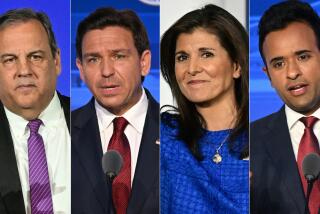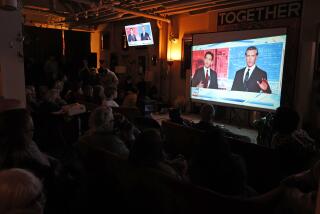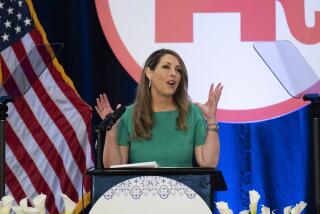Debates that say something
Achallenge arrived at the office of every presidential candidate about two weeks ago. It was a letter, signed by journalist Marvin Kalb and me, challenging each one, Republican and Democrat, to sign on for “Nine Nineties in Nine.” That is, if nominated, they would pledge to take part in nine 90-minute debates in the nine weeks leading up to election day.
How is this different? We are asking the candidates to throw out the rule book that has stifled political debate. Each party’s nominee would be expected to present and defend solutions in a one-on-one dialogue with his or her opponent. The moderator would only keep time and introduce topics.
Former New York Mayor Rudolph Giuliani has informally agreed to “Nine Nineties in Nine,” but so far, former Arkansas Gov. Mike Huckabee is the only candidate to officially accept the challenge.
Our system to elect a president is not working for the American people. The big-city-machine bosses of the past have been replaced by professional political consultant bosses. Sadly, the role of the candidate -- the man or woman who would lead the most powerful nation on Earth -- largely has been reduced to raising the money to hire consultants and then reading what the consultants scrawl on 3-by-5 cards. It’s a stunningly dangerous development for a democracy.
We don’t really have presidential debates today; we have a kind of meaningless political performance art: a recitation of talking points choreographed to avoid any risk.
In the 2004 election, the Bush-Kerry debate rules ran a full 32 pages of do’s and don’ts, including one rule that ordered the moderator to stop any candidate who dared to depart from the script to reference someone in the audience.
The candidates also were ordered to turn over for inspection “all such paper and any pens or pencils with which a candidate may wish to take notes during the debate.” Pen and pencils. Talk about the vital stuff of democracy!
In telling contrast, the ground rules for the most famous debates in U.S. history were outlined in a two-sentence letter from Abraham Lincoln to Stephen Douglas, his opponent in the 1858 race for the U.S. Senate in Illinois. After a prompt exchange of letters, they settled on the terms for seven debates. Lincoln insisted only that “I wish perfect reciprocity, and no more.” There was no talk of pens and pencils.
Much as we did in 1858, the United States today faces a number of very serious challenges: How to protect ourselves from terrorism. How to educate our children so they can compete in the global economy. How to deal with an aging population of baby boomers who desire a better retirement with better healthcare.
These challenges require real solutions -- and to arrive at them, the U.S. needs to have a substantive discussion about our future. But our system doesn’t provide that. Instead, we get attack ads, consultants who specialize in destroying opponents and news media coverage that is narrow, negative and so short in its attention span that no serious idea gets full consideration.
It is important that the 2008 campaign be different. The American people deserve a genuine dialogue in which our potential presidents -- with adequate time for real detail -- outline how they would solve the problems, meet the challenges and develop the opportunities facing the nation. Voters must be provided with clear choices about the future. Only then can the next president -- Democrat or Republican -- be elected with the political support necessary to move the country forward. In the spirit of the Lincoln-Douglas debates, the “Nine Nineties in Nine” challenge commits the nominees to meet once a week -- say, on Sunday nights -- starting after Labor Day 2008.
Let the candidates pick the topics. Let the answers be as long as they need to be. Let the conversation be open-ended.
Each debate would focus on one topic confronting the republic -- such as the threat presented by radical Islam or the challenge of securing our borders -- on which the American people expect their next leader to have solutions. Instead of debating Swift Boat veterans and National Guard papers, we would have a genuinely patriotic discussion about the future of our country.
And after nine 90-minute conversations broadcast to their living rooms and computer screens every Sunday night, Americans will have a remarkable sense of the two personalities vying for their votes. We will know, better than a 30-second ad could ever tell us, which person has the ideas, the character and the capacity to lead our nation.
To get the ball rolling, I propose the first and only ground rule: “Perfect reciprocity, and no more.”
Any more takers?
Newt Gingrich, former speaker of the House, is chairman of American Solutions and author of “Winning the Future.”
More to Read
A cure for the common opinion
Get thought-provoking perspectives with our weekly newsletter.
You may occasionally receive promotional content from the Los Angeles Times.






